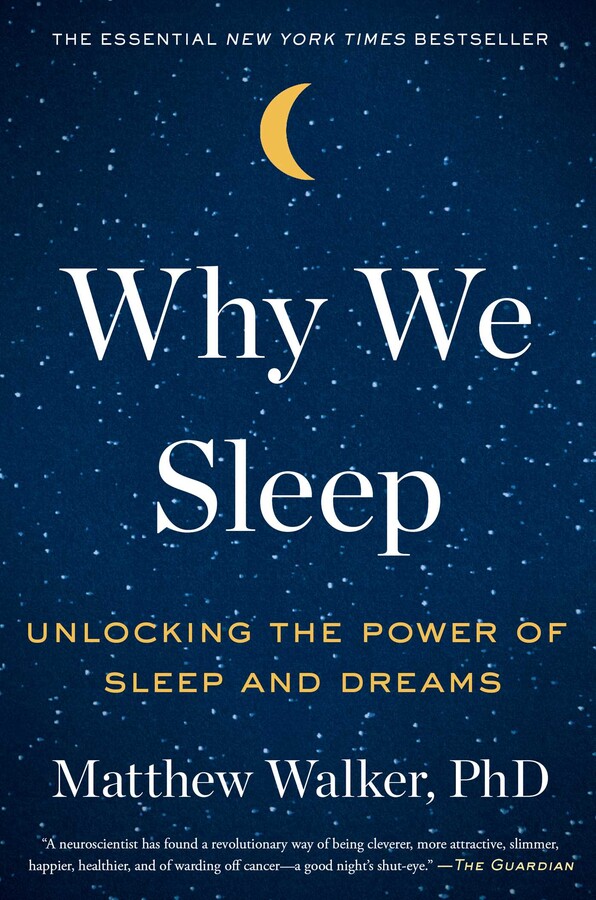
Why We Sleep: Unlocking the Power of Sleep and Dreams
Matthew Walker
About the Author

Matthew Walker
Questions & Answers
Sleep serves multiple critical functions and offers numerous health and cognitive benefits. Primarily, sleep:
-
Enhances Memory and Learning: Sleep, particularly deep sleep (NREM) and REM sleep, aids in memory consolidation and learning. Sleep spindles, a type of brainwave activity during NREM sleep, are crucial for memory refreshment and learning capacity.
-
Supports Brain Health: Sleep helps maintain cognitive functions like decision-making, problem-solving, and emotional regulation. It also supports the brain's ability to repair itself and remove toxins.
-
Boosts Immune System: Sleep strengthens the immune system, helping the body fight off infections and diseases.
-
Regulates Metabolism: Sleep helps regulate blood sugar levels, appetite, and metabolism, reducing the risk of obesity and diabetes.
-
Promotes Physical Health: Sleep is vital for heart health, reducing the risk of heart disease, stroke, and high blood pressure.
-
Enhances Creativity and Problem-Solving: REM sleep, during which dreaming occurs, fosters creativity and problem-solving by connecting disparate pieces of information.
-
Improves Emotional Well-being: Sleep helps regulate emotions, reducing the risk of depression and anxiety.
Insufficient sleep can lead to cognitive impairments, weakened immune response, increased risk of chronic diseases, and emotional instability, highlighting the importance of adequate sleep for overall health and cognitive function.
Sleep deprivation significantly impacts mental health. It impairs concentration, leading to cognitive failures like drowsy driving, and disrupts emotional regulation, causing mood swings and emotional instability. Chronic sleep loss exacerbates psychiatric conditions such as depression, anxiety, and bipolar disorder. It also contributes to the development of mental illnesses by altering brain activity patterns and impacting genes associated with sleep and circadian rhythms. The consequences of chronic sleep loss on psychological well-being include increased risk of mental health disorders, reduced cognitive function, and a higher likelihood of experiencing emotional distress and psychological instability.
The biological mechanisms behind sleep involve a complex interplay of circadian rhythms and sleep stages. Circadian rhythms are regulated by the suprachiasmatic nucleus (SCN) in the brain, which responds to light and dark signals to create a 24-hour cycle. This rhythm influences various bodily functions, including sleep-wake patterns, body temperature, and hormone release.
Sleep stages consist of Non-Rapid Eye Movement (NREM) and Rapid Eye Movement (REM) sleep. NREM sleep is further divided into four stages, with stages 3 and 4 being the deepest. During NREM sleep, the brain consolidates memories and repairs tissues. REM sleep, characterized by rapid eye movements and vivid dreams, is crucial for cognitive functions like creativity and emotional regulation.
The balance between circadian rhythms and sleep stages determines the sleep-wake cycle. The SCN controls the release of melatonin, a hormone that promotes sleep, and the suppression of adenosine, a neurotransmitter that accumulates during wakefulness and promotes sleepiness. The sleep cycle's alternating pattern of NREM and REM sleep allows the brain to efficiently manage memory and cognitive functions, contributing to overall health and well-being.
Improving sleep quality and overcoming common sleep disorders involves a combination of lifestyle changes and non-pharmacological treatments. Key strategies include:
- Establish a Regular Sleep Schedule: Go to bed and wake up at the same time every day, even on weekends, to regulate your body's internal clock.
- Create a Restful Environment: Keep your bedroom dark, cool, and quiet. Avoid electronic devices before bedtime.
- Limit Stimulants: Reduce caffeine and nicotine intake, especially in the evening.
- Exercise Regularly: Engage in physical activity during the day, but avoid vigorous exercise close to bedtime.
- Mind Your Diet: Avoid heavy meals and alcohol before bedtime.
- Relaxation Techniques: Practice relaxation techniques like meditation, deep breathing, or progressive muscle relaxation before bed.
Effective non-pharmacological treatments for sleep issues include:
- Cognitive Behavioral Therapy for Insomnia (CBT-I): This therapy helps identify and change thoughts and behaviors that contribute to sleep problems.
- Sleep Hygiene Education: Learning about good sleep habits and applying them can significantly improve sleep quality.
- Light Therapy: For circadian rhythm disorders, light therapy can help reset your body's internal clock.
- Mindfulness-Based Stress Reduction (MBSR): This technique can help manage stress and improve sleep quality.
- Exercise: Regular physical activity can improve sleep quality, but avoid vigorous exercise close to bedtime.
These methods can be more effective and have fewer side effects than medication, making them a preferred approach for many.
The current state of sleep research reveals a comprehensive understanding of sleep's role in health, learning, and memory. Studies have shown that sleep deprivation can lead to serious health issues, including increased risk of cancer, Alzheimer's, and cardiovascular diseases. Research also highlights the importance of sleep in memory consolidation and cognitive function.
Potential future directions for improving sleep health include:
-
Developing Non-Pharmacological Treatments: Exploring alternative methods like cognitive behavioral therapy for insomnia (CBT-I) and other behavioral interventions to treat sleep disorders without the risks associated with sleeping pills.
-
Personalized Sleep Solutions: Utilizing wearable technology to track sleep patterns and provide personalized recommendations for improving sleep quality.
-
Predictive Analytics: Implementing predictive models to forecast health risks based on sleep patterns, potentially leading to better preventive healthcare.
-
Education and Awareness: Increasing public awareness about the importance of sleep through educational programs in schools and workplaces.
-
Workplace and School Schedule Changes: Adjusting work and school schedules to better align with natural circadian rhythms, reducing sleep deprivation.
-
Sleep Environment Optimization: Improving sleep environments in hospitals, workplaces, and schools to enhance sleep quality.